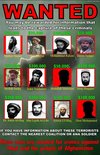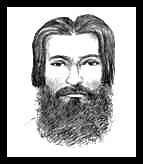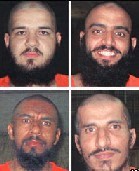The US Department of State has issued multi-million dollar rewards for two senior Taliban leaders and an al Qaeda leader and propagandist.
Up to $5 million dollars has been offered “for information leading to the location and/or capture” of Pakistani Taliban commander Baitullah Mehsud or Taliban and al Qaeda ally Sirajuddin Haqqani. A $1 million bounty has been offered for information leading to the capture or conviction of al Qaeda propagandist and ideologue Abu Yahya al Libi.
|
|
|
Baitullah Mehsud from a recent Taliban video. |
Baitullah Mehsud, Pakistan’s most powerful Taliban commander
Baitullah Mehsud is the leader of the Tehrik-i-Taliban Pakistan, or the Movement of the Taliban in Pakistan, the unified command of scores of local Taliban fighters throughout the Northwest Frontier Province and the tribal areas abutting Afghanistan. He has also joined hands with North Waziristan Taliban leader Hafiz Gul Bahadar and South Waziristan leaders Mullah Nazir and formed the Council of United Mujahideen. The group has pledged its support to al Qaeda leader Osama bin Laden and overall Taliban commander Mullah Omar, and has vowed to battle the Pakistan, US, and Indian governments.
Based out of South Waziristan, he has become the most prominent Taliban leader in Pakistan. He commands tens of thousands of well-trained fighters, who conduct attacks against Pakistani, Coalition, and Afghan forces. Baitullah’s fighters have defeated the Pakistani Army in several engagements since 2004. In January 2008, the Pakistani Army agreed to a ceasefire after abruptly ending an operation after 10 days of fighting.
Baitullah is closely allied with bin Laden and Mullah Omar. Al Qaeda shelters in Baitullah’s tribal areas and maintains training camps and safe houses in the region.
Baitullah has openly stated his intentions to conduct attacks against the United States and the West. He “poses a clear threat to American persons and interests in the region,” the State Department said.
|
A poster of the 12 most wanted in Afghanistan released by the US military in August 2007. At the time, Baitullah Mehsud had a $50,000 bounty and Siraj Haqqani had a $200,000 bounty. |
Hakeemullah Mehsud, Baitullah’s deputy, conducts attacks against NATO convoys and shipping terminals in Peshawar and Khyber. Qari Hussain, another deputy, runs suicide training camps for children.
Some of the most deadly attacks inside Pakistan have been traced back to Baitullah Mehsud’s suicide bombers. He was behind the assassination of former Prime Minister Benazir Bhutto in Rawalpindi in December 2007, as well as the deadly Marriott Hotel suicide attack in Islamabad in September 2008. Scores of other suicide attacks inside Pakistan have been credited to Baitullah.
In the fall of 2007, the US military offered a $200,000 bounty for Baitullah. A wanted poster pictured Baitullah, Sirajuddin Haqqani, and ten other Taliban and al Qaeda leaders.
Over the past year, the US has conducted six covert airstrikes against safe houses and compounds in Baitullah’s tribal areas. The most recent attack took place today, in Baitullah’s home town of Makeen. Eight Taliban and al Qaeda fighters were killed in the attack on a Taliban convoy.
Sirajuddin Haqqani, the leader of the deadly Haqqani Network
Siraj is the son of the powerful and respected former Mujahideen commander Jalaluddin Haqqani. Siraj runs the Haqqani Network, which is closely allied with al Qaeda and actively recruits foreign fighters into its ranks.
The Haqqani Network operates in the eastern Afghan provinces of Khost, Paktia, and Paktika and is based out of the Pakistani tribal area of North Waziristan. Both Jalaluddin and Siraj have close ties with al Qaeda and bin Laden, as well Sheikh Issa al Masri. Sheikh Issa is the spiritual adviser for Egyptian Islamic Jihad, Zawahiri’s organization that merged with al Qaeda, and he is also the leader of al Jihad fi Waziristan, an al Qaeda branch in North Waziristan. Issa has radicalized thousands of Taliban by indoctrinating them with the Wahabbi version of Islam.
The Haqqanis also have extensive links with the Taliban and with Pakistan’s Inter-Service Intelligence agency. The relationship with the ISI has allowed the Haqqani Network to survive and thrive in its fortress stronghold in North Waziristan. The Haqqanis control large swaths of the tribal area, and run a parallel administration with courts, recruiting centers, tax offices, and security forces. The Haqqanis have established multiple training camps and safe houses used by al Qaeda leaders and operatives as well as by Taliban foot soldiers preparing to fight in Afghanistan.
Siraj Haqqani has risen in prominence over the past two years. The US military has described Siraj as the primary threat to security in eastern Afghanistan and offered a $50,000 reward for his capture during the fall of 2007. He is the senior Taliban military commander in eastern Afghanistan.
Siraj is believed to be the mastermind of the most deadly attacks inside Afghanistan, including the military-styled assault on the Serena Hotel and the attack on a parade in Kabul that targeted President Karzai. Most recently, a Haqqani Network suicide bomber killed 14 school children and 11 other Afghans in a suicide attack outside an outpost in Khost.
The US military has conducted multiple cross-border airstrikes against the Haqqani Network’s infrastructure in North Waziristan. Abu Laith al Libi, a senior military commander in Afghanistan as well as the leader of the Libyan Islamic Fighting Group, was killed in a strike in January 2008 in one of more than a dozen strikes against Haqqani compounds in North Waziristan. The US also targeted the Haqqani-run Manba Ulom madrassa, which has served as a command center and meeting place for al Qaeda and Haqqani operatives.
|
|
|
The Bagram Four: Abu Abdallah al Shami (upper left); Abu Nasir al Qahtani (upper right); Abu Yahya al Libi (lower left); Omar al Farouq (lower right). |
Abu Yahya al Libi, al Qaeda propagandist and ideologue
Abu Yahya al Libi was a military commander in Afghanistan until his capture by the US military during 2003. He rose to prominence in al Qaeda after he escaped from Bagram Prison in Afghanistan in the summer of 2005, along with senior al Qaeda operatives Abu Nasir al Qahtani, Abu Abdallah al Shami, and Omar Farouq.
Al Libi is the only member of the notorious “Bagram Four” active in al Qaeda. Two of his fellow escapees have been killed and another has been captured since the 2005 escape. British forces killed Omar Farouq as he attempted to infiltrate Basrah, Iraq in 2006. After his escape from Bagram, Farouq was reassigned to Iraq to facilitate the flow of money, weapons, and fighters for al Qaeda in Iraq. Qahtani was captured in Afghanistan in November 2006. Al Shami was killed during fighting in Afghanistan in the summer of 2008.
Al Libi has become one of the most prolific al Qaeda propagandists. He has appeared in more al Qaeda propaganda tapes since 2006 than any other member of the terror group, including bin Laden and Zawahiri.
He has weighed in on some of the most controversial and important issues on al Qaeda’s agenda. He was the first al Qaeda leader to urge the Pakistani people and the Army to turn against then-President Pervez Musharraf’s regime after the military stormed the radical Red Mosque in the heart of Islamabad. Zawahiri and bin Laden have repeated this call to rebellion several times since then.
Recently al Libi called on Somalis to fight the government and oust President Sheikh Sharif Ahmed, the former leader of al Qaeda ally the Islamic Courts Union. One month later, bin Laden reiterated the call.
Al Libi is a senior leader of the Libyan Islamic Fighting Group, an Islamist terror group that was officially welcomed into the al Qaeda fold in November 2007. Zawahri and Abu Laith al Libi released a videotape announcing the merger.
Al Libi has also chastised Islamists who have denounced al Qaeda’s methods and ideology. He urged clerics to come fight against Americans and NATO and wage real jihad before criticizing the group.
For more information on the Haqqani Network, see:













14 Comments
Baby policy has changed. God speed to all of us. The next round has already began and we all remember Pablo.
It doesn’t make it easy for the U.S. and NATO forces when they are fighting a mind-set like this.
@Marlin, in such case, crush Baitullah Mehsud first with the help of Pak, let us see others later. Now Pak army has lot of free time after Bajaur offensive is over.
Baitullah is in fact the lover in the crowd. He has remained truthful even in the face of blatant disregard. In this case I do agree with Mr. Blair, (something which seldom happens). The EU has continued to try and stay on an approach to peace.
Unfortunantly somewhere we strayed from that straight and narrow path as a country. I can only begin to count what it has cost.
Rumor had it that he was the responsible party behind Bhuttos death. Be that as it may be, I don’t believe it and all things considered I believe that she was merely a pawn who became a marytr to the Muslim cause by sheer presence in the face of pending Nuclear war. They are obviously not the ignorant misguided souls that they were once said to be.
I guess my question is how much expenditure has there been over no threat to the US and is this about to become another Israel situation for this country?
I grew up doing what I know to do best. Whatever that may be, never left a circle of peers and know no life outside of it. Cause and Reason do not just produce intelligence they also produce guerrilla warfare. We were completely unprepared for it and out of training for it when it came, I hesitate to think what is next, but I don’t think that I like the direction that it is taking us.
Interesting that the US chose to put equal bounties on two Taliban leaders. There is a difference between the two.
One is Baitullah Mehsud, of Pakistan-Taliban, and aligned to Al-Qaeda.
The second is Sirajuddin Haqqani (son of famed Jalauddin Haqqani), of Afghan-Taliban, and aligned to ISI of Pakistan.
Bait would be called the “Bad Taliban” and Siraj the “Good Taliban” – of course by who else but by the Pakistanis. Strange that this “farcical logic” is being considered by Obama.
Glad to see some coherence from the US on the bounty.
Kemal Ataturk took Turkey away from religion towards moderation. The first thing he did was to remove the veil the women wore – and this is how he did it. He said: From now on, prostitutes must wear veil.
He did not say, who should not wear veil. By that one edict, the normal women stopped wearing veil, in case people thought of them to be prostitutes. Simple and brilliant.
Pakistan lacks such leaders or has the courage to take on people like Baitullah Mehsud or even Sufi Mohammad. The most brilliant piece of conversation that Sufi Md said recently:
Daily Times: You said in a 2005 interview with us that what Al Qaeda and the Taliban are doing in Pakistan is haram. Are Maulana Fazlullah’s activities over the last sixteen months also haram?
Sufi Muhammad: Yes, I said that about Al Qaeda, but not about the Taliban. Let me say…that debate on past happenings is disallowed in Islam. A hadith sharif says, what has happened in the past should not be discussed.
But how can we proceed without debating the past?
The hadith sharif says a Muslim should not discuss past happenings because he may not remember all the [details] and, therefore, he may…sin by not speaking the truth.
WHAT THE **** IS HE TALKING ABOUT? IS THIS FOR REAL? Oh yes, this is Pakistan – hence it is REAL.
Oh no, not another bounty on terrorists’ heads.
The ACLU, Human Right First (and Watch), Amnesty International, the Guantanamo Bay Bar Association, and the Center for Constitutional Rights will all have their knickers in a knit.
Bill,
How is this supposed to work.
1. US puts bounty on the heads of senior Al-Qaeda and Taliban leaders.
2. New York Times reports that shadowy “S” wing of ISI is talking to Taliban and helping Taliban stage attacks in southern Afghanistan on US / ISAF / NATO forces.
Ignoring confirmation about the Pakistan’s continued support and use of terrorism obtained through electronic surveillance and informants, and even brazen affirmation by Pakistani officialdom itself, the Obama administration is set to lavish a bonanza that might eventually add up to more than $ 30-$ 35 billion over the next decade.
About half the windfall will come from the US and the other half from its allies such as Japan, EU, and Gulf countries.
Washington is set to announce its largesse of around $ 15 billion of US tax-payer money in course of its new Af-Pak policy to be unveiled Friday, followed by a conference in Tokyo on April 17 of the so-called ”Friends of Pakistan” where Islamabad is pitching for $ 10 billion.
SO BILL, DOES TERRORISM PAY?
A rewards program never hurts, but branding is important, too.
So, Brother Bill, will you be renaming the site, “Overseas Contingency Operations Journal”?
Not too sexy, that…
One wonders just how effective a high dollar reward might be in the FATA. StrategyPage (although understandably unsourced) would have you believe it has an effect.
StrategyPage: Who Can A terrorist Trust?
Bengal,
This is just a guess on my part, but it seems to me that the reason we’re killing Mehsud’s guys is as sort of a quid pro quo so that the less Salafi/Deobandi-friendly folks in the ISI will do more turning on the bad guys. Same thing with the aid. As I understand things, there are wheels within wheels both in the Pakistani government in general and the ISI in particular. Money and missiles are a bit of a crude tool, but right now it’s what we have, and I suspect that BHO is hoping that they’ll move enough folks from the bad guys to at least the neutral camp. It may not work, but then, nothing of that sort is ever guaranteed.
The Thunder Run has linked to this post in the blog post From the Front: 03/26/2009 News and Personal dispatches from the front and the home front.
While the bounty itself is a statement of intent of no small value I wonder whether such a big fanfare is not giving too much importance to these people. Maybe there are other, more discreet ways to pass the message.
I can understand that the bounty might send the political message that at least these three are not to be re-integrated and remain outcasts. Sending the message shows determination against them returning to power and strengthens their local rivals.
But it also sets expectations. I am unconfortable with endorsing the statement that was posted by Marlin. Tribal leaders in many parts of the FATA and the Afghan tribal belt have been killed or intimidated in their hundreds by a combination of the insurgents on both sides and their institutional backers. It’s rather the other way round: The islamist paramilitaries control the tribal elders.
Some of the concepts also seem wrong. The Haqqanis have the status of tribal leaders themselves, old man Haqqani is a larger than life figure in the eyes of many Zadran youth. Siraj tries to get that status.
And the notice / bounty system makes us expect there would be a way to get them.
Money won’t do it. It’s not as if so far there had been a shortage of cash infusions in the tribal belt. On the downside a raised bounty gives an aspiring tribal leader like the younger Haqqani added prestige.
And aren’t people like al-Libi anyhow winning if they die after having attained great status? Their personal plan is to become a martyr, inspire imitation?
Hunting these leaders with wanted notices and lots of troops and big guns might sometimes be necessary, but in many cases I believe there are alternatives too.
It might be worth adding in your overview that Sirajuddin Haqqani (TI.H.144.07) is also on the UN Sanctions list established by the security council. See: http://www.un.org/sc/committees/1267/consolist.shtml
The sanctions are a non-lethal approach to contain Taliban and al-Qaida. Operating through Interpol and member states, the sanctions regime is an expression of the biggest coalition in the world – the United Nations.
See for a good elaborated argument: http://icsr.opendemocracy.net/Papers
I am not sure we are using the local culture to our best advantage. I wonder what the result would be if we offered 5 million to the TRIBE that provides information leading to the capture ….